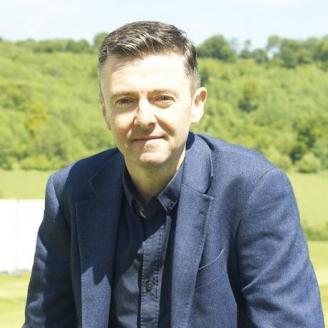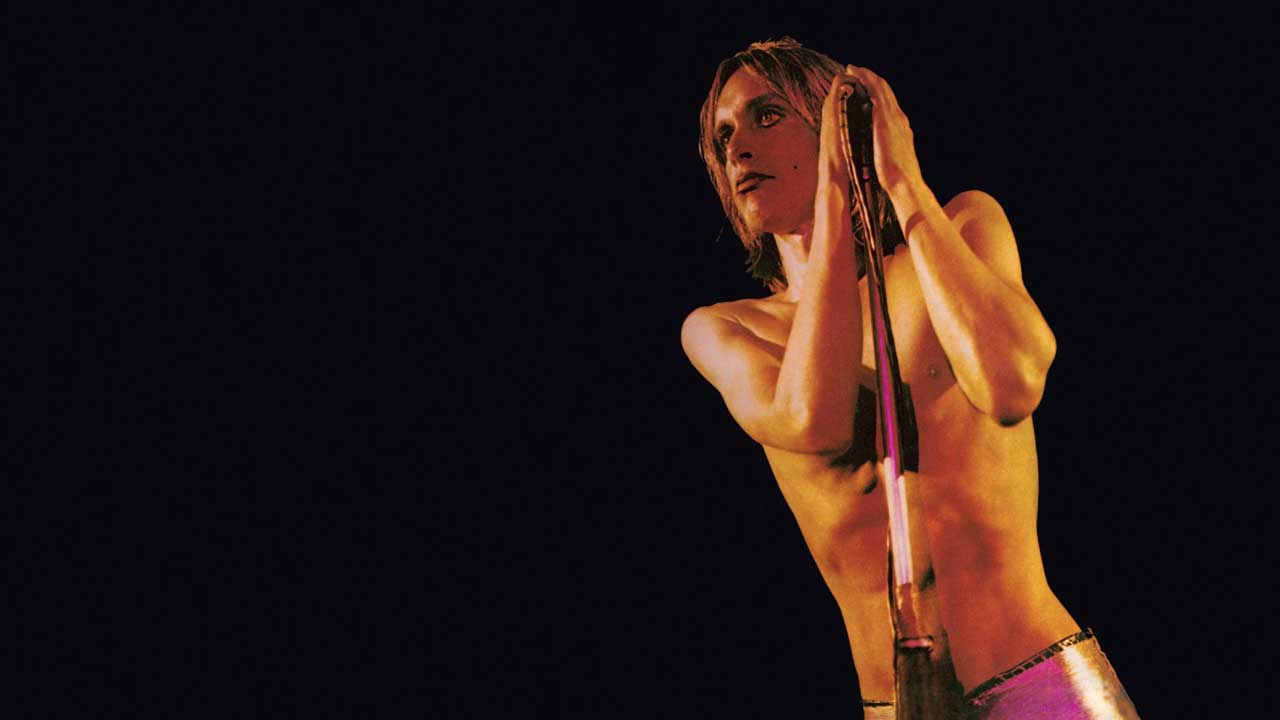"I was afraid something inside of me was dying. Leaving was an act of survival": Life in the fast lane and the turbulent tale of the Eagles
Fistfights, ulcers and run-ins with the law were all part of the Eagles’ everyday life: A look behind the rise, fall and unexpected rise again of the ultimate Californian band
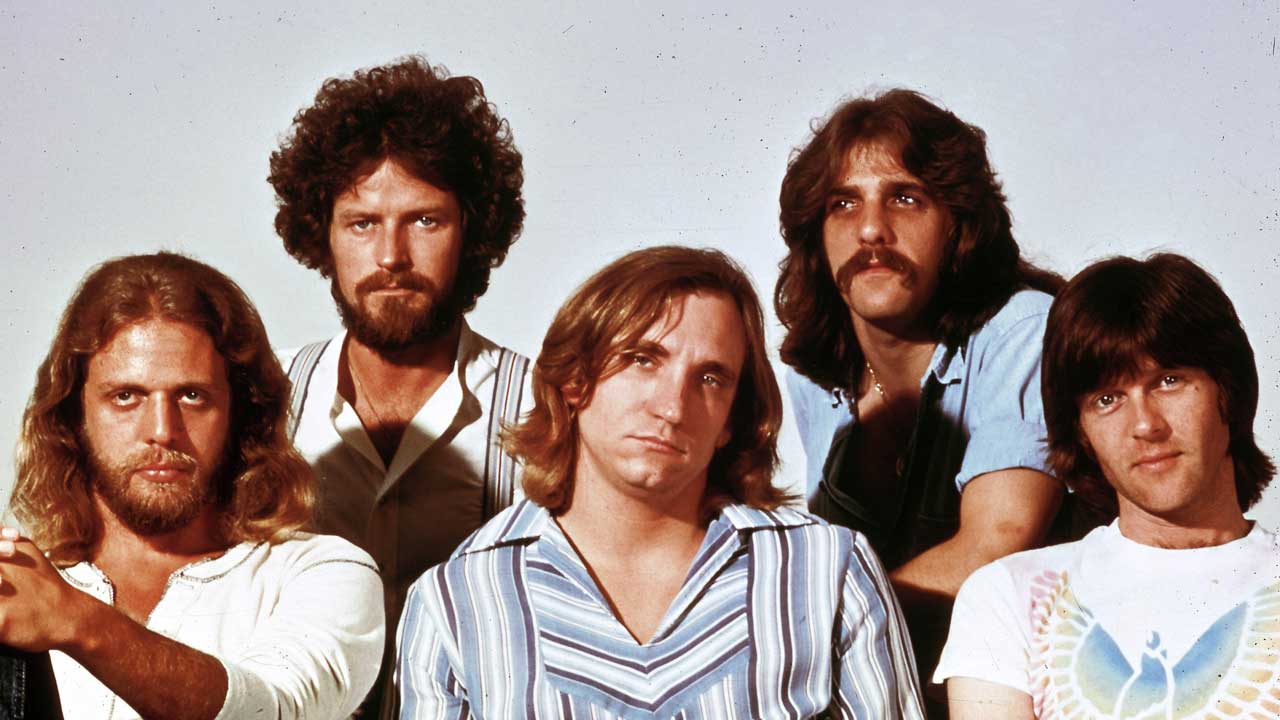
Some years ago, after the Eagles had broken up, Glenn Frey remembered: “We were on stage, and Don Felder looks at me and says: ‘Only three more songs until I kick your ass, pal’. And I’m saying: ‘Great, I can’t wait’. We were singing Best Of My Love, but inside both of us were thinking: ‘As soon as this is over, I’m going to kill him’.”
In the light of such circumstances, it’s not surprising that Don Henley once admitted: “I had an ulcer before I was thirty because of the Eagles”. And the music of the Eagles sounded so cool, so effortless. They wrote songs that defined the woozy, Southern California idyll: Peaceful Easy Feeling, Desperado, Tequila Sunrise and scores of others.
Rarely, though, has the internal life of a band been so at odds with the sounds that it made. “Led Zeppelin could argue with us, but I think we might have thrown the greatest travelling party of the 70s,” Glenn Frey remembered. He was talking about the Eagles’ infamous ‘third encore’, the debauched gathering that would follow every gig, featuring the band, their entourage, hangers-on, bizheads “and as many beautiful girls as we’d meet from the airport to the hotel”.
The Eagles took Learjets like other people take cabs. Don Henley would send one to pick up his girlfriend, Stevie Nicks, after she’d finished a gig with Fleetwood Mac. They’d hire them, Elvis-style, to fly in food and cases of Chateau Lafite Rothschild when Henley celebrated his birthday.
For half a decade during the 1970s, the Eagles seemed unstoppable, rising upwards on great thermals of fame and success. But the whole thing fell apart when they tried to record a follow-up to their creative and commercial highpoint that was Hotel California.
During the three years of intensity and insanity that were the making of The Long Run, Don Henley is said to have composed a long memo to the recording studio manager informing him of his displeasure that the lavatory paper in the toilets came off the bottom of the dispenser and not the top. ‘If it was meant to come from the bottom,’ the memo allegedly ran, ‘then the little flowers would be printed on the underside of the paper’.
“The Long Run was not as good as Hotel California, and it was an excruciatingly painful album to make,” Henley said. “We were having fights all the time about the songs – enormous fights about one word – for days on end. That record took three years and cost $800,000, and we burned out.”
Sign up below to get the latest from Classic Rock, plus exclusive special offers, direct to your inbox!

Don Henley had always been tense. Even when the band were making millions of dollars and he’d shared a house in the Hollywood Hills (that used to belong to film star Dorothy Lamour) with Glenn Frey, and they’d sit and look at the whole of Los Angeles spread out before them and think: ‘It really doesn’t get much better than this’, he would be worrying about something or other.
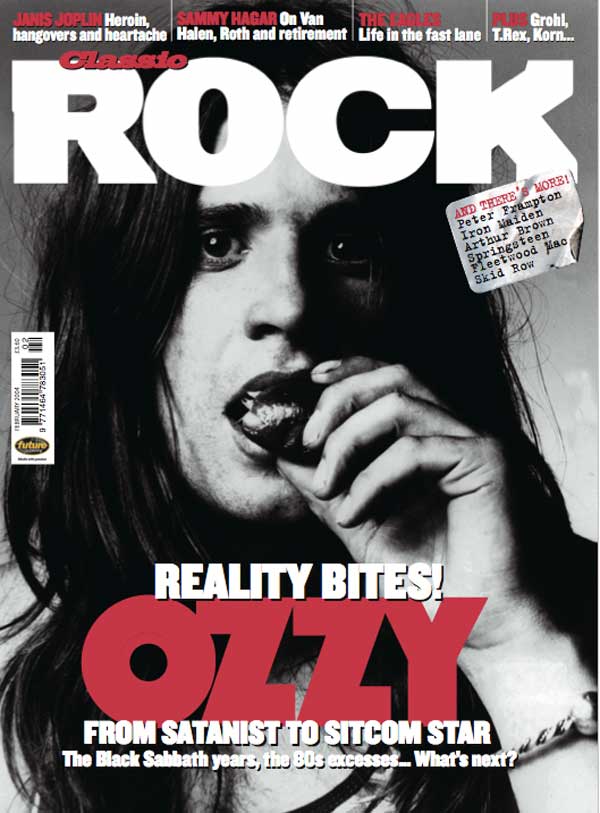
His oldest friend, a musician called Richard Bowden, who was better known as Balloon Dick, remembered: “Joe Walsh came up to me just after he’d joined the Eagles and said: ‘You’ve known him the longest. Just tell him to relax’. I told him: ‘Just let Don be tense. He’s always been that way. When he solves one problem, he just moves on to something else to worry about’.”
Henley and Bowden had grown up together in a town in Texas called Linden, which had a population of just over 2,000. “Mrs Henley was a real fine lady, but she never had any control over Don,” Bowden told Rolling Stone magazine when they profiled the band in 1976. “Not that he didn’t respect her, he just always did what he wanted. And his father would have to come down on him. They couldn’t get along for years. Don always felt he had to prove something to him.”
His father was a worrier, too. He was a hard-working man who saved 25 cents a week for Henley’s college fund, and ultimately Henley did not complete his education. C J Henley’s death was pivotal to Don’s world view.
“I figured out a long time ago, when my father got sick and died, that life wasn’t fair,” he said, “but I got mad about it. I used to go around and cuss God all the time, because my father died too early and he suffered. He only lived to see Take It Easy and a couple of weeks of Witchy Woman.
"He literally worked and worried himself to death, and he had a cardiac and he died on July 7, 1972, after four or five other heart attacks. You don’t know what’s real until you see your father in the emergency room heaving and gasping for breath and saying: ‘Oh God! Oh God!’ Everything else gets real trite after that. There’s been a lot of death in my family.”
Don Henley played drums in Bowden’s first band, The Four Speeds, which became Shiloh. More death came when Jerry Dale Surratt, one of that band, was killed while messing about on his motorcycle right in front of the band and his family outside their rehearsal rooms in Linden. Things were never the same again for Shiloh, and first Bowden and then Henley went to Los Angeles.
There Henley encountered singer/guitarist Glenn Frey in 1970. Frey had drifted from Detroit to California at the age of 19, and had met guitarist J D Souther on his first day in town.
“I grew up running in Detroit,” Frey remembered. “I went to school with the sons and daughters of automobile factory workers – fathers who beat their wives and beat their kids. The kids would then go to school and beat on me. My father was a machinist in a shop that built the machines that built car parts.
"I had a pretty normal childhood. My parents weren’t drinkers. I always had clothes. I always went to camp for a week in the summer. My parents didn’t have enough money to buy me a car when I turned sixteen, but I had a great childhood.”
Congregating at the Troubadour club where The Byrds and Buffalo Springfield and other SoCal scenesters hung out, everyone was dreaming the same dream.
“We all watched the sun set in the west every night of adolescence and thought someday about coming out here,” Frey told the LA Times. “It all seemed so romantic… The Life magazine articles about Golden Gate Park and the Sunset Strip… And the music: The Beach Boys, The Byrds, Buffalo Springfield. It was definitely the archetype of the most beautiful place in the world.”
“Glenn asked if I’d like to go on the road with Linda Ronstadt’s band, and I said: ‘You bet I do,’” Henley said of their first, fateful connection. “I was broke, and here was a chance for two hundred dollars a week. We went out for a month or two, and Glenn and I struck up this great friendship. That’s when we started plotting to put a band together.”

The relationship between Henley and Frey – both their friendship and the writing partnership – became the key one in the Eagles right from the start. They met bassist Randy Meisner first – he was standing about six feet away, also backing Linda Ronstadt. Then, legend has it, they came across singer/guitarist Bernie Leadon on a drunken day out at Disneyland.
After the third rehearsal, Frey turned to Henley and said conspiratorially: “We’re going to have to run things…”
David Geffen, who was busy building an empire of his own, had signed up Joni Mitchell, Tom Waits, Linda Ronstadt, Jackson Browne, J D Souther and other artists. He gave the Eagles some money, and Jackson Browne co-wrote Take It Easy with them.
It came out as a single on May Day 1972, and became, almost instantaneously, the soft-rock radio classic that it remains today. And for the Eagles the repercussions began. It was, as Rolling Stone reported, ‘Hell from the very start’. Leadon and Meisner resented Henley and Frey but couldn’t do much about it. Henley and Frey began living together, and, as Jackson Browne said: “Glenn always went around messing things up, and Don always followed him around cleaning things up”.
It was as if they had a portrait of Dorian Gray in the attic: the more beautiful the sounds they made (the Eagles album came out in 1972; Desperado in ’73; On The Border in ’74; One Of These Nights in ’75), the uglier things became within the band.
Leadon quit for the first time in 1975, saying: “I kept asking: ‘Are we going to rest next month?’ I wanted to get in shape before the age of thirty so I would have a chance at the rest of my life. I was afraid something inside of me was dying. Leaving was an act of survival.”
Desperado was the album that defined Eagles, in terms of their image as much as their sound. They styled themselves after a bunch of real-life outlaws, the Doolin-Dalton Gang. Henley and Frey used the cowboy mythology to explore their own tortured feelings about the sexual and financial and social politics of the US. It was another of their contradictions: these beautiful songs that could just pass you by in a haze of melody, and yet carried such spite and bite.
“In retrospect, I admit that the whole cowboy-outlaw-rocker myth was a bit bogus,” Henley said after the band had split for the first time, in 1980. “I don’t think we really believed it, we were just trying to make an analogy. Suddenly we were getting famous and making all this money, and it just turned our little heads around. We were living outside the laws of normality, we were out here in LA, things were kind of Western, and we just decided to write something about it to try to justify it to ourselves."
“When the band first started,” Henley recalled, “I never thought we’d last more than a couple of years. I thought we’d make a couple of albums and that would be it. At first we loved what we were doing, and then, once we got a modicum of success, we said, well, this is nice.
"Then we realised that staying there was harder than getting there, which is always the case. So then we put all our energies into staying up there, realising that you have your hour in the sun and then you live the rest of your life in the shade.
“In any event, those first three or four records were just as much us trying to grow up as anything. We were trying to explain things to ourselves, and a lot of the time we didn’t know what we were talking about. There’s something on all those albums that makes me cringe. I mean, our whole quest as we went along was to try to make each album better than the previous one. And that’s difficult to do when you’re trying to run a group as a democracy. Keeping that group together was a full-time job.”
The other members of the Eagles started calling Don Henley Grandpa. He’d taken drugs with the best of them – he’d needed to, to keep up with the band’s relentless schedule – but he hated the fact that they fucked things up.
“I guess there was a brief period of time where I tried to put some kind of creative stock into drugs,” he said, “but I realised pretty soon that you could get more work, and better work, done if you were straight. We did a lot of work on drugs in the Eagles.
"Our schedule was just so gruelling; we didn’t have the stamina otherwise. We’d do things like go out on tour, play a few gigs, then get on a Lear jet and fly to Miami and start recording at four o’ clock in the morning, then get back on the Lear jet at three or four in the afternoon and go back to Cleveland and do a concert. And we’d do it all just to meet deadlines. So we took drugs.
“But from the beginning in the Eagles I would get in fights with the other guys about smoking joints or doing coke before going on stage. Using drugs would screw up their voices, and they’d sing out of tune. So I got the nickname of Grandpa. I mean, drugs had their place, but I was never one of those guys to get up and roll a breakfast joint.”
The Eagles released a greatest hits album – the famous one with the blue cover with a bird’s skull on – and it sold 22 million copies. Until Michael Jackson’s Thriller surpassed it many years later it was the biggest album of all time. And then they made Hotel California.
The implosion of the Eagles, the years of rancour and regret, all began with a little guitar noodle that Don Felder came up with one idle afternoon. “I had just leased this house out on the beach at Malibu. I guess it was around ’74 or ’75,” Felder told Guitar magazine many years on. “I remember sitting in the living room, with the doors all wide open, on a spectacular July day. I had a bathing suit on and I was sitting on this couch, soaking wet, thinking the world is a wonderful place to be.
"I had this acoustic twelve-string and I started tinkling around with it, and those Hotel California chords just kind of oozed out. Every once in a while it seems like the cosmos parts and something great plops into your lap. I had a four-track set up in one of the back bedrooms, and I ran back there to put this idea down before I forgot it.
“When I gave Henley the cassette it had eight or ten different song ideas on it. He came back and said: ‘I really love this one track on your tape, the one that sounds like a matador or something… like you’re in Mexico’. We worked it all up and went into the studio and recorded it.”
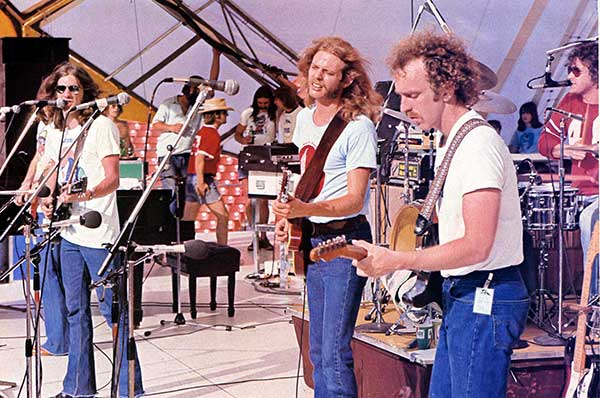
Henley and Frey took Felder’s Mexican melody somewhere else entirely with the lyric. It was another of their bittersweet epics, all superficial shimmer and sad-eyed social comment.
“I think he and Glenn had this idea, kind of the fantasy of California. It’s supposed to be kind of a microcosm of the world,” Felder said. “But I wouldn’t want to speak for them. The ‘You can check out any time you like, but you can never leave’ line was based on Jackson Browne’s first wife, who committed suicide. In other words, you can check out, die, but you’re still in the cosmos somewhere. You’re not going to get out of that karmic phase of it.
“The way Glenn and Don worked it was, Glenn was great at conceptualising. He’ll say: ‘I can see this guy driving in the desert at night, and you can see the lights of LA, way off on the horizon…’ Henley gets the picture and goes from there. He was an English literature major. He writes really great prose. He can take those snapshots and put them into just two or three lines.”
Henley viewed his gift for a telling phrase as a double-edged sword. “Life In The Fast Lane – by God if they didn’t turn that into a celebration of exactly what we were trying to warn them about,” he said of the cautionary third track on Hotel California. “Everybody’s got cocaine now, no matter how shitty it is. I could hardly listen to that song when we were recording it, because I was getting high a lot at the time and the song made me ill.
“We were trying to paint a picture that cocaine wasn’t that great. It turns on you. It messed up my back muscles, it messed up my nerves, it messed up my stomach, and it makes you paranoid. I’m not saying I’m an angel or a saint now, because I’m not, but I’ve slowed down quite a bit.”
The Hotel California album came out in 1976, year that punk rock began. Henley struggled with the guilt of it all: “You know that you don’t deserve it. You get too much money and too much of everything when you’re too young, and it comes really quickly. And it messed me up for a while. I grew up in a town of 2,400 people. My dad didn’t believe in credit cards, he paid cash for everything. And suddenly I had a gold American Express card which I was embarrassed to take out of my wallet because I’d never done that before.”
By now, Henley, Frey and the band (including new guitarist Joe Walsh) were confronting the enormity of the Eagles and the ubiquity of Hotel California. “If you were to ask a struggling, twenty-five-year-old musician: ‘How would you like to sell eighteen million albums?’ he’d say: ‘Yeah! Damn right I would’,” Glenn Frey explained.
“The next question is: ‘But how would you like to try to make one as good as the one that sold millions and millions of records?’ Somebody asked my friend Bob Seger: ‘Why do you think the Eagles broke up?’ He said: Hotel California.”
They began making the follow-up album, and it was difficult from the start. “Don and I did not have any fun working on The Long Run together,” Frey told Interview magazine. “Henley and I would sit across from each other for hours not saying a word. We would sit trying to write, but we were both afraid to suggest a lyric or a chord in case it wasn’t perfect, in case it wasn’t great.”
They cut the first track, I Can’t Tell You Why, a lush ballad from the new bass player Timothy B Schmit, on March 9, 1978. Fifteen months later they weren’t much further on.
To demonstrate exactly how big the Eagles had become, and how intense the pressure on them was, the band’s manager, the acerbic Irving Azoff, told Rolling Stone: “We only hear from the record company about ten times a week. When they project a $116-million-year because Linda Ronstadt and the Eagles are going to release albums, and then they come up $40 million short from not having an Eagles album, they hurt.”
Elektra/Asylum concurred. The company chairman, Joe Smith, said: “We all need that record now, but there’s no guarantee how it will do. A lot of new bands have come out since the Eagles last released an album.”
On the door of Bay Shore recording studio in Miami, the band had pasted cut-outs from hundreds of magazines and newspapers, and had written captions and private jokes about their sexual habits, favourite drugs, football bets and more for all of them. It was to the studio manager here that Henley wrote the famous toilet paper memo…
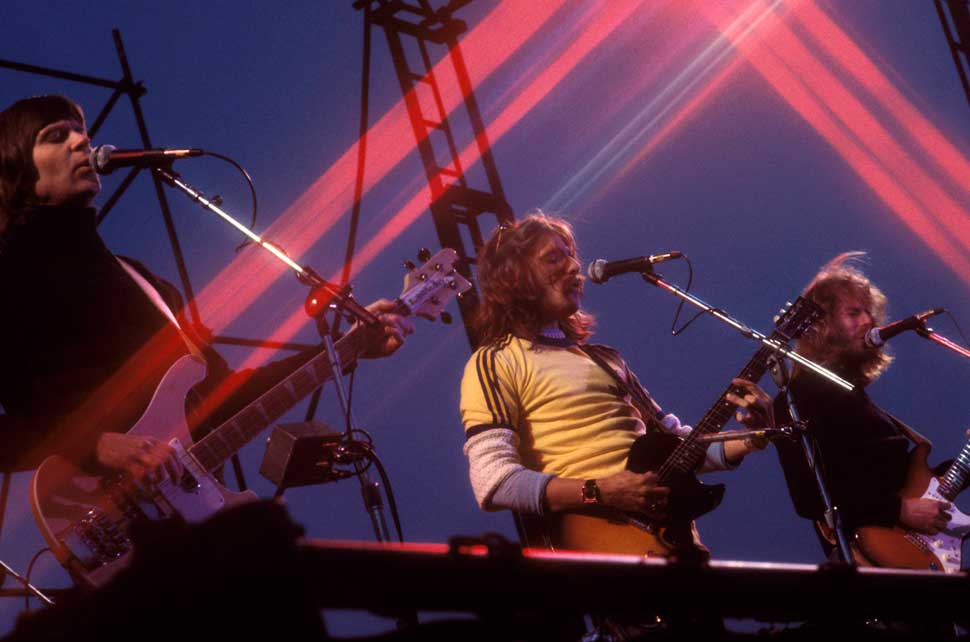
So they were in it together, trying to grind out a hit album that the record company were desperate for in a new and uncertain artistic landscape. Bored with the recording process, assaulted by their individual concerns, the Eagles responded in time-honoured fashion: they got out of it. They called it getting ‘monstered’: you could be ‘half monstered’, ‘three-quarters monstered’, or usually, ‘totally monstered’. Frey’s nickname was Roach, after his love of a joint.
“We haven’t always practised everything in moderation,” he admitted. “But we were figuring out the slow burn, the long run. If you use cocaine like the Indians use it – when you have to, but not all the time – you don’t get toxic. I thank God I have enough close friends who would tell me if I were messing up my life. Thank God for the love and support I’ve received from them. But if there’s a night to party, you go right a-fucking-head…”
Don Henley’s enthusiasm for such extracurricular activities made him something of a Hollywood legend. One particular incident at his California home, which featured five prostitutes, a sex aid and prodigious amounts of cocaine, was excessive enough to feature in the famous exposé of La-La Land You’ll Never Make Love In This Town Again.
When The Long Run finally came out in 1979, it had been three years since Hotel California, an eternity in the music business of the 1970s, and the world had indeed changed. It sold several million copies quite quickly, but where the society of the 70s had chimed with the Eagles’ sensibility, the 80s would prove very different. They were called misanthropes and cynics. Their attitudes to women were called into question.
“I suppose a lot of good art down through the ages has come out of turmoil and stress, but this was just too much,” Henley explained. “This misanthrope business has always been a complete mystery to me. We were critical, but for fair reasons. We cared about our fellow man; we cared about the ecology; we cared about the Indians; we cared about nuclear energy. And so we would point out what was wrong. I don’t consider that to be misanthropic.
“We were arrogant. Sure. You have to be arrogant if you’re going to be in a rock’n’roll band. But, you know, I thought we were pretty nice people all in all.”
“I’m though my Playmate period,” Frey said as The Long Run emerged. “I constantly ask myself what I think of women. Lately I’ve been feeling much less physical, you know, where you meet a real pretty girl and immediately attach all these great qualities to her. But women are objects for men, whether or not sex objects. They’re a goal. That’s the way we’re bought up.”
Don Henley threw another party at his Hollywood home to celebrate the end of the tour to support The Long Run. Police arrived in the early hours and discovered that a 16-year-old girl had overdosed. Henley was arrested and charged with possession of marijuana, cocaine and Quaaludes, and contributing to the delinquency of a minor. He was fined, put on two years’ probation and ordered to attend drug counselling.
“I had no idea how old she was and I had no idea she was doing that many drugs,” Henley explained afterwards. “I didn’t have sex with her. Yes, she was a hooker. Yes, there were roadies and guys at my house. We were having a farewell to the Eagles.”
In its own way it was a fitting finale. When time gave Henley some distance from that final year, he realised how awful 1979 and 1980 had been, how close to ruin he had come.
“It was a terrible year,” he said. “The band broke up. I broke up with my girlfriend and got into trouble with the law. Then I met my new girlfriend and we almost got killed in a private plane crash in Colorado. John Lennon got killed, and that devastated me for a while. And my girlfriend contracted a virus and she has been practically an invalid for a year and five months.”
He and Glenn Frey didn’t really announce the end of the band. Instead they went to Irving Azoff separately and played him the solo albums they had recorded. It was 1982 by the time an announcement was made.
“I have no regrets,” Henley said. “A lot of people in the media attach more importance to bands that came out of the 60s than bands that came out of the 70s, so I don’t know how the Eagles will be remembered. Some day, though, I think people may look back and say: ‘Some of that stuff was pretty good after all’.”
He was right. The band had written scores of beautiful and brilliant songs. But more than that, they had come to embody a particular life and a particular time. By 1986 they were being asked to reunite.
“I don’t think so,” Frey said. “We were offered two million dollars to play the US Festival and two and a half million to play the second one. One of my managers at the time said: ‘Come on, you rehearse for a couple of weeks, you play the gig, that’s it’. He had just gotten a divorce from his wife, and I said: ‘I’ll go rehearse with the Eagles if you’ll go back for a couple of weeks with your wife’. I can’t see myself at age forty-one, up on stage, with a beer belly, singing Take it Easy. Without a reunion, the Eagles are forever young, like James Dean.”
It was with wry humour, then, that the eventual reunion, in 1994, was called Hell Freezes Over.
“Well,” Henley said, “we worked long and hard. We earned it. It is payday. We prided ourselves on the fact that were one of the only bands of our generation left where all the members are still living.”
He paused. “Actually, I really think that’s an achievement.”
This feature was originally published in Classic Rock 63, (January 2004).
Jon Hotten is an English author and journalist. He is best known for the books Muscle: A Writer's Trip Through a Sport with No Boundaries and The Years of the Locust. In June 2015 he published a novel, My Life And The Beautiful Music (Cape), based on his time in LA in the late 80s reporting on the heavy metal scene. He was a contributor to Kerrang! magazine from 1987–92 and currently contributes to Classic Rock. Hotten is the author of the popular cricket blog, The Old Batsman, and since February 2013 is a frequent contributor to The Cordon cricket blog at Cricinfo. His most recent book, Bat, Ball & Field, was published in 2022.
![Eagles - Hotel California (Live 1977) (Official Video) [HD] - YouTube](https://img.youtube.com/vi/09839DpTctU/maxresdefault.jpg)
![Eagles - In The City (Official Video) [HD] - YouTube](https://img.youtube.com/vi/J39LK_wDzKw/maxresdefault.jpg)
